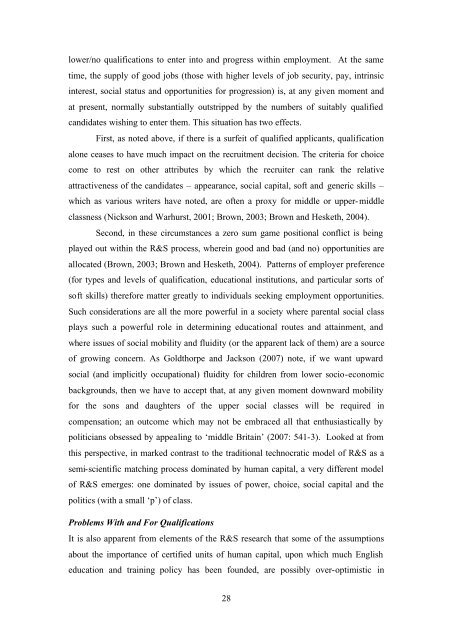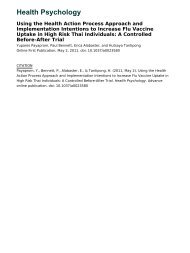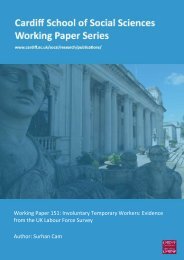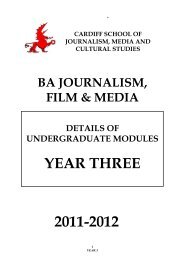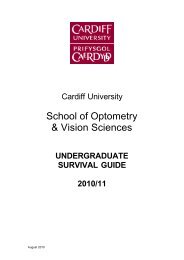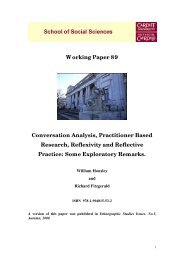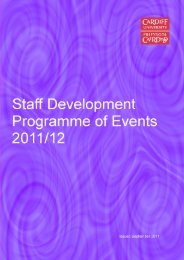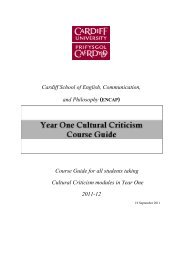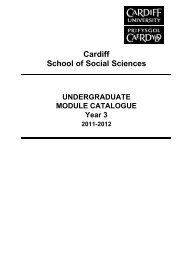Recruitment and Selection â the Great Neglected ... - Cardiff University
Recruitment and Selection â the Great Neglected ... - Cardiff University
Recruitment and Selection â the Great Neglected ... - Cardiff University
You also want an ePaper? Increase the reach of your titles
YUMPU automatically turns print PDFs into web optimized ePapers that Google loves.
lower/no qualifications to enter into <strong>and</strong> progress within employment. At <strong>the</strong> same<br />
time, <strong>the</strong> supply of good jobs (those with higher levels of job security, pay, intrinsic<br />
interest, social status <strong>and</strong> opportunities for progression) is, at any given moment <strong>and</strong><br />
at present, normally substantially outstripped by <strong>the</strong> numbers of suitably qualified<br />
c<strong>and</strong>idates wishing to enter <strong>the</strong>m. This situation has two effects.<br />
First, as noted above, if <strong>the</strong>re is a surfeit of qualified applicants, qualification<br />
alone ceases to have much impact on <strong>the</strong> recruitment decision. The criteria for choice<br />
come to rest on o<strong>the</strong>r attributes by which <strong>the</strong> recruiter can rank <strong>the</strong> relative<br />
attractiveness of <strong>the</strong> c<strong>and</strong>idates – appearance, social capital, soft <strong>and</strong> generic skills –<br />
which as various writers have noted, are often a proxy for middle or upper-middle<br />
classness (Nickson <strong>and</strong> Warhurst, 2001; Brown, 2003; Brown <strong>and</strong> Hesketh, 2004).<br />
Second, in <strong>the</strong>se circumstances a zero sum game positional conflict is being<br />
played out within <strong>the</strong> R&S process, wherein good <strong>and</strong> bad (<strong>and</strong> no) opportunities are<br />
allocated (Brown, 2003; Brown <strong>and</strong> Hesketh, 2004). Patterns of employer preference<br />
(for types <strong>and</strong> levels of qualification, educational institutions, <strong>and</strong> particular sorts of<br />
soft skills) <strong>the</strong>refore matter greatly to individuals seeking employment opportunities.<br />
Such considerations are all <strong>the</strong> more powerful in a society where parental social class<br />
plays such a powerful role in determining educational routes <strong>and</strong> attainment, <strong>and</strong><br />
where issues of social mobility <strong>and</strong> fluidity (or <strong>the</strong> apparent lack of <strong>the</strong>m) are a source<br />
of growing concern. As Goldthorpe <strong>and</strong> Jackson (2007) note, if we want upward<br />
social (<strong>and</strong> implicitly occupational) fluidity for children from lower socio-economic<br />
backgrounds, <strong>the</strong>n we have to accept that, at any given moment downward mobility<br />
for <strong>the</strong> sons <strong>and</strong> daughters of <strong>the</strong> upper social classes will be required in<br />
compensation; an outcome which may not be embraced all that enthusiastically by<br />
politicians obsessed by appealing to ‘middle Britain’ (2007: 541-3). Looked at from<br />
this perspective, in marked contrast to <strong>the</strong> traditional technocratic model of R&S as a<br />
semi-scientific matching process dominated by human capital, a very different model<br />
of R&S emerges: one dominated by issues of power, choice, social capital <strong>and</strong> <strong>the</strong><br />
politics (with a small ‘p’) of class.<br />
Problems With <strong>and</strong> For Qualifications<br />
It is also apparent from elements of <strong>the</strong> R&S research that some of <strong>the</strong> assumptions<br />
about <strong>the</strong> importance of certified units of human capital, upon which much English<br />
education <strong>and</strong> training policy has been founded, are possibly over-optimistic in<br />
28


